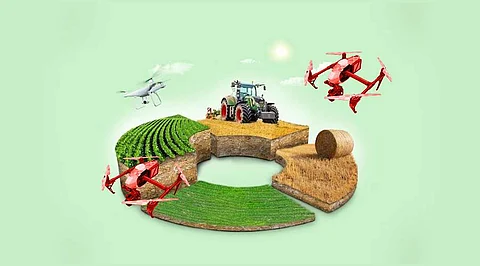

1. Drone Ag: Crop spraying is a labor-intensive activity in agricultural operations that calls for large machinery. Therefore, existing crop spraying techniques do not enable precision spraying and spraying more material than necessary. Furthermore, it is extremely wasteful because even little patches of ground require using tractors and other large equipment. Because of this, entrepreneurs are developing autonomous drones that can spray crops more precisely. Software for various unmanned drones is produced by the UK-based business Drone Ag. The business creates Skippy Scout, drone control software for agricultural scouting. The DJI Agras system, an automated crop-spraying drone with centimeter-level navigational precision, is used by drone agriculture. By streamlining processes and cutting expenses, Drone Ag's technology helps agricultural activities, including controlling bracken, eliminating weed areas, and sowing seeds. Their products also make it possible to map fields and scout crops automatically.
2. AgroFly: AgroFly is a Swiss firm that designs, manufactures, and sells agricultural uncrewed aerial vehicles (UAVs). Drones from the company replace the requirement for heavy-load frame drones or sizable tanks filled with spraying material with a high-precision agricultural sprayer. Additionally, the drone sprays its target without drifts because of the high level of accuracy. Crop spraying is a technique that uses large machinery or requires much hand work. Farmers use drone-based crop spraying solutions to eliminate the need for large machinery or physical work. However, because there are so many crops to spray, drones must make several trips or have bigger tanks, which restricts how far they can fly. Startups are concentrating on creating nozzles and spraying accessories to get around this problem.
3. Kurai: Crop monitoring is crucial for managing farms, disease prevention, and yield estimation, among other things. For this reason, farmers utilize aerial imaging technologies to comprehend their crops and obtain information about them. The drawbacks of these techniques include the high expenses of satellite imaging and the greenhouse gas emissions produced by the monitoring planes. Startups are creating drones to monitor crops using improved positioning and artificial intelligence to address these issues. Kurai, a South African firm, uses drones to provide data-driven agricultural monitoring and treatment solutions. Its multi-spectral drones gather and examine precise pictures of fields to produce crop-specific insights used to monitor crop health, save input costs, and spot issues. The system includes AI, deep learning, and prescription maps synchronized with agricultural machinery for tracking the health of crops and soil, among other things. The drones allow farmers and farm operators to use economically feasible precision agricultural technologies to make data-driven decisions.
4. Drone Japan: Drone Japan is a Japanese start-up company focusing on drone-based remote sensing systems for agricultural monitoring. The firm examines the information provided by drones and other sensors to provide comprehensive reports that specify the best time to harvest, assist with yield forecasts, etc. Agribusinesses, production companies, agricultural cooperatives, local governments, and others gain from the startup's farm analytics solution. Farmers are using sensors, aircraft, and satellites to monitor their crops and collect data for farm management. Startups are using drones to examine farms to reduce the high expenses connected with the equipment and technology to collect data from numerous levels.
5. Trithi Robotics: Because the fungus that invades the berry impacts the growth and quality of the bean, crop diseases like coffee berry disease are quite severe. Additionally, the illness spreads quickly, rendering significant areas of whole coffee estates useless. Because plantations are so big, heavy equipment cannot be used to protect them from illnesses, which makes the work labor-intensive. Startups are helping plantation owners in this situation by building drones that promote the preservation and rehabilitation of plantations. Precision agricultural drones are being developed by Indian start-up TRITHI Robotics, particularly for preserving and recovering crops from illness. Its approach employs multispectral camera-equipped drones, spray tanks, and post-processing software to scan and treat the whole crop. The startup's drones minimize employment losses caused by agricultural disease damage and the time, labor, and money needed to safeguard or restore crops.
Join our WhatsApp Channel to get the latest news, exclusives and videos on WhatsApp
_____________
Disclaimer: Analytics Insight does not provide financial advice or guidance. Also note that the cryptocurrencies mentioned/listed on the website could potentially be scams, i.e. designed to induce you to invest financial resources that may be lost forever and not be recoverable once investments are made. You are responsible for conducting your own research (DYOR) before making any investments. Read more here.
